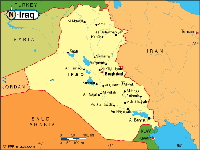Roadside bombs kill 3 people in Iraq
Three roadside bombs killed a U.S. Army soldier and two Iraqi civilians, and police found the bodies of four Iraqi men in Baghdad who apparently had been kidnapped and tortured, police said Tuesday.

The American casualty occurred about 9:50 p.m. Monday, approximately 60 kilometers (40 miles) south of Baghdad. The area is part of the infamous "triangle of death" and the scene of numerous ambushes against U.S. and Iraqi troops, foreigners and Shiite civilians.
The bombing raised to at least 2,406 the number of members of the U.S. military who have died since the beginning of the Iraq war in March 2003, according to an Associated Press count.
It was the first reported U.S. fatality in May. In April, 70 American servicemen died in Iraq, the highest monthly figure since November, when 84 U.S. servicemen were killed.
Monday's deadliest insurgent attack in Iraq occurred in Madain, a Shiite town 14 miles (22 kilometers) southeast of Baghdad, when a bomb exploded in an outdoor vegetable market, killing four Iraqis and wounding two.
In Tuesday's violence, a roadside bomb missed a U.S. convoy in Waziriyah, northern Baghdad, killing one civilian bypasser, said police Cap. Ali al-Obeidi. A roadside bomb also missed an Iraqi police patrol, killing one civilian and injuring another one in western Baghdad, said police 1st Lt. Maithem Abdel-Razaq.
At 7:30 a.m., police found the bodies of four Iraqi men on the streets of Kazimiyah, a Shiite neighborhood in northern Baghdad, police Lt. Col. Falah al-Mohammedawi said. The legs and hands of the men were bound with rope, and each had been shot in the head and chest before being dumped on a street, said al-Mohammedawi.
On Monday, at least 15 bullet-riddled bodies were found in the capital, Iraq's Interior Ministry said. The victims were men aged 20-40 years; all were handcuffed and blindfolded, the ministry said.
U.S. officials hope the new Iraqi government, expected to be finalized this month, will be able to calm sectarian tensions and lure many minority Sunni Arabs away from the insurgency so U.S. and other international troops can begin heading home.
President Jalal Talabani was quoted by his office as saying Sunday that he had met with representatives of seven armed groups and was optimistic they would agree to lay down their arms. However, an official in Talabani's office said Monday the president did not meet with the groups and that his security adviser, Lt. Gen. Wafiq al-Sammaraie, made the contacts.
Another Kurdish politician, Mahmoud Othman, also said Talabani had not met with any insurgent representatives but that al-Sammaraie was in contact with undisclosed groups not linked to Saddam Hussein loyalists or al-Qaida in Iraq.
In Washington, U.S. President George W. Bush said he was convinced Iraq's leadership is "more determined that ever to succeed" with formation of a new permanent government, reports the AP.
I.L.
Subscribe to Pravda.Ru Telegram channel, Facebook, RSS!




